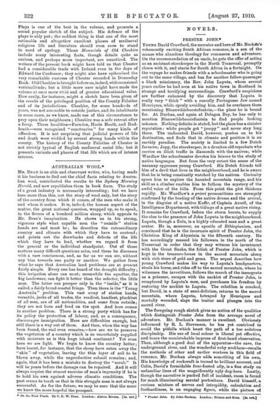AUSTRALIAN WOOL.*
MR. BRAN is an able and observant writer, who, having made it his business to find out the chief facts relating to Austra- lian wool, contributed the results to the Sydney Morning Herald, and now republishes them in book form. The study of a great industry is necessarily interesting ; but we have here more than this, not the story of wool only, but the story of the country from which it comes, of the men who make it and whom it makes. It is, indeed, the human aspect of the matter, the great national question, wrapped up, so to speak, in the fleeces of a hundred million sheep, which appeals to Mr. Bran's imagination. He shows us in his strong, vigorous style what capable men the "outside" station hands are and must be ; he describes the extraordinary country and climate with which they have to contend ; and points out the drawbacks and defects of the life which they have to lead, whether we regard it from the general or the individual standpoint. Out of these matters many difficult questions arise, and these be discusses with a rare conciseness, and, as far as we can see, without any bias towards one party or another. We gather from what he says that Australian land problems are at present fairly simple. Every one has heard of the drought difficulty ; this irrigation alone can meet; meanwhile the squatter, the big landowner, can fight it better than the selector, the little man. The latter can prosper only in the "inside," as it is called, a fairly broad coastal fringe. Then there is the "Young Australia" problem. This vast army of station hands, versatile, jacks of all trades, the readiest, handiest, pluckiest of all men, are of all nationalities, and come from outside ; they are not born and bred on the spot. And here comes in another problem. There is a strong party which has for its policy the protection of labour, and, as a consequence, discourages immigration. Here are difficulties enough, but still there is a way out of them. And then, when the way has been found, the real crux remains,—how are we to preserve the vegetation of a country which is so uncertainly supplied with moisture as is this huge island continent? Yet even here we see light. We begin to know the country better; have learnt, for instance, that the sheep have eaten away the "skin" of vegetation, leaving the thin layer of soil to be blown away, while the unproductive subsoil remains ; and, again, that it has been a mistake to destroy the "scrub." It will be years before the damage can be repaired. And it will always require the utmost exercise of man's ingenuity if he is to hold his own against adverse climatic conditions. The past seems to teach us that in this struggle man is not always successful. As for the future, we may be sure that the more we know the more hopeful the prospect.
• On tho Wool Tina, By C. B. W. Bran. London: Alston Rivers. [5s. net.]






































 Previous page
Previous page